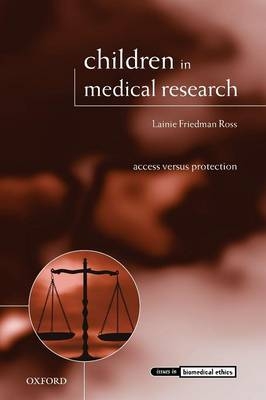
Children in Medical Research
Access versus Protection
Seiten
2008
Oxford University Press (Verlag)
978-0-19-923042-6 (ISBN)
Oxford University Press (Verlag)
978-0-19-923042-6 (ISBN)
Lainie Ross presents a rigorous critical investigation of the development of policy governing the involvement of children in medical research. She examines the shift in focus from protection of medical research subjects, enshrined in post-World War II legislation, to the current era in which access is assuming greater precedence. Infamous studies such as Willowbrook (where mentally retarded children were infected with hepatitis) are evidence that before the policy shift protection was not always adequate, even for the most vulnerable groups. Additional safeguards for children were first implemented in many countries in the 1970s and 1980s; more recent policies and guidelines are trying to promote greater participation. Ross considers whether the safeguards work, whether they are fair, and how they apply in actual research practice. She goes on to offer specific recommendations to modify current policies and guidelines.
Ross examines the regulatory structures (e.g. federal regulations and institutional review boards), the ad hoc policies (e.g. payment in pediatric research and the role of schools as research venues), the actual practices of researchers (e.g. the race/ethnicity of enrolled research subjects or the decision to enroll newborns) as well as the decision-making process (both parental permission and the child's assent), in order to provide a broad critique. Some of her recommendations will break down current barriers to the enrolment of children (e.g. permitting the payment of child research subjects; allowing healthy children to be exposed to research that entails more than minimal risk without requiring recourse to 407 panels); whereas other recommendations may create new restrictions (e.g., the need for greater protection for research performed in schools; restrictions on what research should be done in the newborn nursery). The goal is to ensure that medical research is done in a way that promotes the health of current and future children without threatening, to use the words of Hans Jonas, 'the erosion of those moral values whose loss . . . would make its most dazzling triumphs not worth having'.
Ross examines the regulatory structures (e.g. federal regulations and institutional review boards), the ad hoc policies (e.g. payment in pediatric research and the role of schools as research venues), the actual practices of researchers (e.g. the race/ethnicity of enrolled research subjects or the decision to enroll newborns) as well as the decision-making process (both parental permission and the child's assent), in order to provide a broad critique. Some of her recommendations will break down current barriers to the enrolment of children (e.g. permitting the payment of child research subjects; allowing healthy children to be exposed to research that entails more than minimal risk without requiring recourse to 407 panels); whereas other recommendations may create new restrictions (e.g., the need for greater protection for research performed in schools; restrictions on what research should be done in the newborn nursery). The goal is to ensure that medical research is done in a way that promotes the health of current and future children without threatening, to use the words of Hans Jonas, 'the erosion of those moral values whose loss . . . would make its most dazzling triumphs not worth having'.
Lainie Ross is the Carolyn and Matthew Bucksbaum Professor of Clinical Medical Ethics, an Associate Director of the MacLean Center and co-director of the Ethics Consultation Service that provides both clinical and research ethics consultation. Dr. Ross has published two books on pediatric ethics: Children, Families and Health Care Decision Making (Oxford University Press, 1998) and Children in Medical Research: Access versus Protection (Oxford University Press, 2006). She is currently writing a third book, The Genetic Testing and Screening of Infants and Children.
I. ACCESS VERSUS PROTECTION; II. CHALLENGES TO THE REGULATIONS; III. STRENGTHS AND LIMITS OF CURRENT REGULATIONS; IV. CASE STUDIES
| Erscheint lt. Verlag | 1.6.2008 |
|---|---|
| Reihe/Serie | Issues in Biomedical Ethics |
| Zusatzinfo | numerous tables |
| Verlagsort | Oxford |
| Sprache | englisch |
| Maße | 157 x 233 mm |
| Gewicht | 472 g |
| Themenwelt | Geisteswissenschaften ► Philosophie ► Ethik |
| Medizin / Pharmazie ► Medizinische Fachgebiete ► Medizinethik | |
| Medizin / Pharmazie ► Medizinische Fachgebiete ► Pädiatrie | |
| Studium ► Querschnittsbereiche ► Geschichte / Ethik der Medizin | |
| ISBN-10 | 0-19-923042-0 / 0199230420 |
| ISBN-13 | 978-0-19-923042-6 / 9780199230426 |
| Zustand | Neuware |
| Haben Sie eine Frage zum Produkt? |
Mehr entdecken
aus dem Bereich
aus dem Bereich
Die Geschichte eines Weltzentrums der Medizin von 1710 bis zur …
Buch | Softcover (2021)
Lehmanns Media (Verlag)
17,95 €
Krankheitslehren, Irrwege, Behandlungsformen
Buch | Softcover (2024)
C.H.Beck (Verlag)
39,95 €


